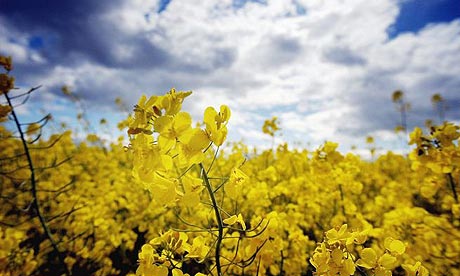NGOs accuse industry body of inflating claims that the acreage of biotech crops grew by 8% in 2011

Pro- and anti-GM organisations clashed on Tuesday over the accuracy of industry figures that suggested a rise internationally of 8% in the acreage of GM crops in 2011, a 16th straight rise since they were first sold in 1996.
The International Service for the Acquisition of Agribiotic Applications (ISAAA), an industry body funded by GM companies including Monsanto, Bayer CropScience and CropLife International, claimed in its annual report that biotech crops grew by 12m hectares, to 160 million hectares, in 2011.
"A record 16.7 million farmers, up 1.3 million or 8% from 2010, grew biotech crops – notably, over 90%, or 15 million, were small resource-poor farmers in developing countries. Seven million small farmers in China and another 7 million in India, collectively planted a record 14.5 million hectares of biotech crops," said the report.
ISAAA said that developing countries were expected to grow more GM crops than rich countries in 2012 for the first time. "Unprecedented adoption rates are testimony to overwhelming trust and confidence in biotech crops by millions of farmers worldwide," said Clive James, author of the annual ISAAA report.
The food crops, which are mostly herbicide-resistant varieties of maize, soya and oilseed rape, are grown now in 29 countries but over 40% by acreage is grown in the US. Much of the rest is grown in Brazil and Argentina, with Bt cotton grown mostly in China and India.
Wenonah Hauter, director of the NGO Food and Water Europe, accused the ISAAA of inflating the statistics by including "trait acres", a figure derived by multiplying the surface area grown by the number of genetic traits engineered in GM crops. Using this system, said Hauter, ISAAA could argue that a field of GM crops that had three genetically engineered traits became three "trait fields", thereby tripling the acreage.
"Our analysis ... reveals they derive their figures from reliance on biased data sources, overstating the benefits of GM for farmers and ignoring figures that don't support their pro-GM position. They have a vested interest in the success of GM technology, and their figures simply can't be trusted," said Hauter.
The ISAAA, which is based in the Philippines, could not be contacted last night.
Friends of the Earth Europe and Greenpeace both claimed that the industry had in effect given up trying to persuade Europe to accept the crops, due to opposition from the majority of consumers, farmers and politicians.
Greenpeace said in a statement: "Last month BASF, the world's biggest chemical company, said it was abandoning plans to develop and commercialise GM food in Europe. The total acreage grown in Europe is now 0.1% of the cultivable land available and only Spain marginally increased its acreage grown in 2011."
Mute Schimpf, food campaigner at Friends of the Earth Europe, said: "The public's rejection of genetically modified crops has ensured that they are confined to small pockets of the European Union. In comparison, organic farming accounted for 3.7%."
,
'庫間 > 해외자료' 카테고리의 다른 글
| 미국식 대형 돼지농장이 인권을 위반할 수 있다고 경고하는 영국의 지방의회 (0) | 2012.02.11 |
|---|---|
| 유기농 실험이 중국 농촌에 활력을 가져오다 (0) | 2012.02.11 |
| 풀 먹인 소와 사육장의 소 - 무엇이 다른가? (0) | 2012.02.03 |
| 식량과 기후변화 (0) | 2012.02.02 |
| 중동 지역의 옥상텃밭 (0) | 2012.01.31 |